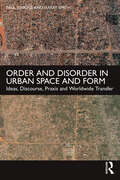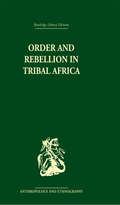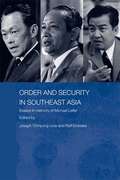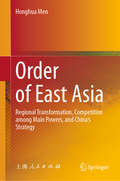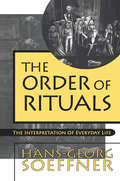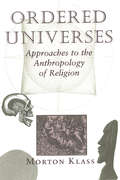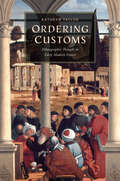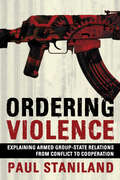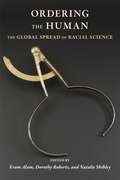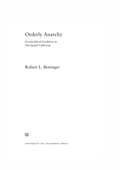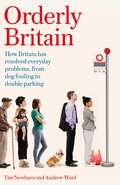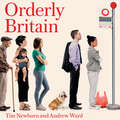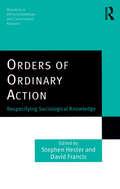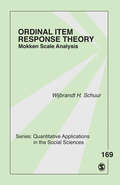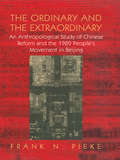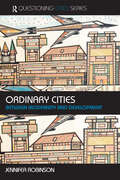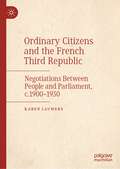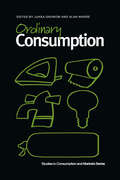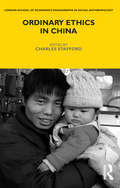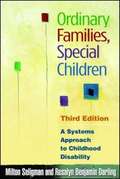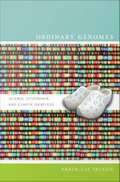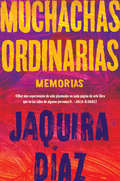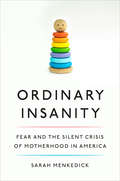- Table View
- List View
Order and Disorder in Urban Space and Form: Ideas, Discourse, Praxis and Worldwide Transfer
by Harry Smith Paul JenkinsThe global application of Enlightenment-derived concepts to create social order through urban form suggests that we believe we know how to create a (future) ordered environment. But these notions of order and disorder need interrogation, especially as the world rapidly urbanises. Not only have such approaches failed to produce more social order, but it has become clear that the imposition of these ideas in cities of the South cuts across alternative systems of social and cultural order and creates new disorder. Thus, if we are serious about forms of urban order, then it is time to rethink what we mean by order in the fi rst place. As this provocative and timely book shows, what we think of as urban order is partial and restricted, and what we perceive as disorder usually masks underlying orders of social nature. The book is intended for architects, urban designers, planners and urban scholars, as well as urban policymakers, managers and residents, to consider a different approach to emerging urban space and form, starting from an understanding of the cultural imaginaries and social constructs that underpin the production of most urban fabric and engaging with these concepts and organisational forms to improve urban life for the majority.
Order and Rebellion in Tribal Africa
by Max GluckmanThese essays are mainly concerned with the development of some of Max Gluckman's ideas about African politics. He regarded frequent rebellions to replace incumbents of political offices (as against revolutions to alter the structure of offices) as inherent in these politics. Later he connected this situation with modes of husbandry, problems of the devolution of power, types of weapons and the law of treason. He advanced to a general theory of ritual, as well as to general propositions about the position of officials representing conflicting interests within a hierarchy, typified by the African chief under colonial rule. Originally published in 1963.
Order and Security in Southeast Asia: Essays in Memory of Michael Leifer (Politics in Asia)
by Joseph Chinyong Liow Ralf EmmersMichael Leifer, who died in 2001, was one of the leading scholars of Southeast Asian international relations. He was hugely influential through his extensive writings and his contacts with people in government and business in the region. In this book, many of Leifer’s students, colleagues and friends come together to explore the key themes of his work on Southeast Asia, including the notion of ‘order’, security, maritime law and foreign policy. The book concludes with an overall assessment of Leifer’s background, worldview and impact on his field. A scholarly and personal volume devoted to Leifer's vast contributions to the discipline of international relations, this text is a must-read for students and scholars specializing in the region.
Order of East Asia: Regional Transformation, Competition among Main Powers, and China’s Strategy
by Honghua MenThis book describes the past, present and future of East Asian order, and analyzes how China, Japan, the U.S and ASEAN play important roles in the transformation of East Asian order, and discusses the new logic of regional order formation in the era of globalization and regional integration. The book analyzes China’s relationship with East Asian order, great powers and regional institutions involved, especially bilateral relations between China and Japan, China and the U.S., China and ASEAN, and explores how China could improve its regional strategy. Addressing a hot topic in world politics from the angle of regional order, and using methods such as historical analysis, comparative analysis, quantitative analysis and case study, this readable book enables readers to develop an understanding of the history and status quo of East Asia and China’s role in the region.
Order of Rituals: The Interpretation of Everyday Life
by Hans-Georg SoeffnerTo those still accustomed to seeing social order depicted in classes, strata, central groups, or institutions, and who measure and classify the social world according to "centers" and "margins," modern society presents itself as ambiguous and unmanageable. This is not unprecedented. Human societies often discover themselves in situations in which the traditional grids of order and stratification lose their value and fail to serve as guideposts for individuals.In The Order of Rituals, Hans-Georg Soeffner aims to answer the question: Through what efforts of order and orientation are loosely organized societies like ours held together? Soeffner focuses on symbolic forms of self-presentation that bring focus and clarity to our lives, such as emblems, fashions, styles, and symbols. As these replace old orders of classes or strata, there is a further consequence. Economically, culturally, and ethnically "mixed" societies not only return to specific visible forms of presentation, but also present themselves and their worldviews as a public stage of life-styles, attitudes, and demeanor.Soeffner asserts that society preserves certain continuously handed-down forms of action and ritual as specific symbolic forms over a long period of time. The Order of Rituals describes these symbols and routines of everyday life in fascinating detail, coupled with thoughtful analysis. Sociologists, anthropologists, and philosophers will all benefit immensely from this book.
Ordered Universes: Approaches To The Anthropology Of Religion
by Morton KlassThis innovative introduction to the anthropological study of religion challenges traditional categories and assumptions, arguing that too many of them reflect ethnocentric perspectives long discarded by contemporary anthropologists. The continued use of such terms as supernatural" and cult" inescapably communicates that what is under study is not as real or true as the beliefs of the observer. This conflict between the axioms of science and Western scholarship and those of the belief systems under study can be avoided with careful attention to terminology and underlying assumptions. Ordered Universes introduces and explores important anthropological issues, concerns, and findings about the institution of religion approached as a human cultural universal. Klass applies a non-ethnocentric perspective to each topic, relying on contemporary anthropological theories and using approaches deriving from other subdivisions of the discipline. Offering operational, non-judgmental definitions that avoid taking a position on whether the belief under study is true" and providing examples from ethnographic (and other) literature on religion, Klass explores values, beliefs, witchcraft, shamans, sacrifice, ghosts, revitalization, and many other concepts. In the final chapters, he considers the emergence of new religious movements and leaders and evaluates the continuing ideological conflict between proponents of scientistic, fundamentalist, and post-rationalist systems of thought.
Ordering Customs: Ethnographic Thought in Early Modern Venice (The Early Modern Exchange)
by Kathryn TaylorOrdering Customs explores how Renaissance Venetians sought to make sense of human difference in a period characterized by increasing global contact and a rapid acceleration of the circulation of information. Venice was at the center of both these developments. The book traces the emergence of a distinctive tradition of ethnographic writing that served as the basis for defining religious and cultural difference in new ways. Taylor draws on a trove of unpublished sources—diplomatic correspondence, court records, diaries, and inventories—to show that the study of customs, rituals, and ways of life not only became central in how Venetians sought to apprehend other peoples, but also had a very real impact at the level of policy, shaping how the Venetian state governed minority populations in the city and its empire. In contrast with the familiar image of ethnography as the product of overseas imperial and missionary encounters, the book points to a more complicated set of origins.
Ordering Violence: Explaining Armed Group-State Relations from Conflict to Cooperation
by Paul StanilandIn Ordering Violence, Paul Staniland advances a broad approach to armed politics—bringing together governments, insurgents, militias, and armed political parties in a shared framework—to argue that governments' perception of the ideological threats posed by armed groups drive their responses and interactions. Staniland combines a unique new dataset of state-group armed orders in India, Pakistan, Burma/Myanmar, and Sri Lanka with detailed case studies from the region to explore when and how this model of threat perception provides insight into patterns of repression, collusion, and mutual neglect across nearly seven decades. Instead of straightforwardly responding to the material or organizational power of armed groups, Staniland finds, regimes assess how a group's politics align with their own ideological projects.Explaining, for example, why governments often use extreme repression against weak groups even while working with or tolerating more powerful armed actors, Ordering Violence provides a comprehensive overview of South Asia's complex armed politics, embedded within an analytical framework that can also speak broadly beyond the subcontinent.
Ordering the Human: The Global Spread of Racial Science (Race, Inequality, and Health #15)
by Eram Alam, Dorothy Roberts, and Natalie ShibleyModern science and ideas of race have long been entangled, sharing notions of order, classification, and hierarchy. Ordering the Human presents cutting-edge interdisciplinary scholarship that examines the racialization of science in various global contexts, illuminating how racial logics have been deployed to classify, marginalize, and oppress.These wide-ranging essays—written by experts in genetics, forensics, public health, history, sociology, and anthropology—investigate the influence of racial concepts in scientific knowledge production across regions and eras. Chapters excavate the mechanisms by which racialized science serves projects of power and domination, and they explore different forms of resistance. Topics range from skull collecting by eighteenth-century German and Dutch scientists to the use of biology to reinforce notions of purity in present-day South Korea and Brazil. The authors investigate the colonial legacies of the pathologization of weight for the Maori people, the scientific presumption of coronary artery disease risk among South Asians, and the role of racial categories in COVID-19 statistics and responses, among many other cases. Tracing the pernicious consequences of the racialization of science, Ordering the Human shines a light on how the naturalization of racial categories continues to shape health and inequality today.
Orderly Anarchy: Sociopolitical Evolution in Aboriginal California
by Robert L. BettingerOrderly Anarchy delivers a provocative and innovative reexamination of sociopolitical evolution among Native American groups in California, a region known for its wealth of prehistoric languages, populations, and cultural adaptations. Scholars have tended to emphasize the development of social complexity and inequality to explain this diversity. Robert L. Bettinger argues instead that "orderly anarchy," the emergence of small, autonomous groups, provided a crucial strategy in social organization. Drawing on ethnographic and archaeological data and evolutionary, economic, and anthropological theory, he shows that these small groups devised diverse solutions to environmental, technological, and social obstacles to the intensified use of resources. This book revises our understanding of how California became the most densely populated landscape in aboriginal North America.
Orderly Britain: How Britain has resolved everyday problems, from dog fouling to double parking
by Andrew Ward Tim NewburnHow do British pavements remain free of dog mess? Why are paths not littered with cigarette butts or roads not lined with abandoned cars? What does the decline of the public lavatory say about us and is the national reputation for queuing still deserved today?Orderly Britain takes a topical look at modern society, examining how it is governed and how it organises itself. It considers the rules of daily life, where they come from and why they exist. It asks whether citizens are generally compliant and uncomplaining or rebellious and defiant. This quirky social history takes a close look at shifting customs and practices, people's expectations of each other and how rule-makers seek to shape everyone's lives - even when ignoring some of those rules themselves.Taking the reader on a journey that covers a range of topics - dog mess, smoking, drinking, parking, queuing, toilets - Orderly Britain examines the rapidly changing patterns of everyday life, from post-war to present day, and concludes with an extended look at the unparalleled shifts in social routines that resulted from the global COVID-19 pandemic. Asking whether it is the proliferation of rules and regulations in the UK or something else that keeps people in line, authors Tim Newburn and Andrew Ward offer a unique insight into what creates orderly Britons.
Orderly Britain: How Britain has resolved everyday problems, from dog fouling to double parking
by Andrew Ward Tim NewburnHow do British pavements remain free of dog mess? Why are paths not littered with cigarette butts or roads not lined with abandoned cars? What does the decline of the public lavatory say about us and is the national reputation for queuing still deserved today?Orderly Britain takes a topical look at modern society, examining how it is governed and how it organises itself. It considers the rules of daily life, where they come from and why they exist. It asks whether citizens are generally compliant and uncomplaining or rebellious and defiant. This quirky social history takes a close look at shifting customs and practices, people's expectations of each other and how rule-makers seek to shape everyone's lives - even when ignoring some of those rules themselves.Taking the reader on a journey that covers a range of topics - dog mess, smoking, drinking, parking, queuing, toilets - Orderly Britain examines the rapidly changing patterns of everyday life, from post-war to present day, and concludes with an extended look at the unparalleled shifts in social routines that resulted from the global COVID-19 pandemic. Asking whether it is the proliferation of rules and regulations in the UK or something else that keeps people in line, authors Tim Newburn and Andrew Ward offer a unique insight into what creates orderly Britons.
Orderly Britain: How Britain has resolved everyday problems, from dog fouling to double parking
by Andrew Ward Tim NewburnHow do British pavements remain free of dog mess? Why are paths not littered with cigarette butts or roads not lined with abandoned cars? What does the decline of the public lavatory say about us and is the national reputation for queuing still deserved today?Orderly Britain takes a topical look at modern society, examining how it is governed and how it organises itself. It considers the rules of daily life, where they come from and why they exist. It asks whether citizens are generally compliant and uncomplaining or rebellious and defiant. This quirky social history takes a close look at shifting customs and practices, people's expectations of each other and how rule-makers seek to shape everyone's lives - even when ignoring some of those rules themselves.Taking the reader on a journey that covers a range of topics - dog mess, smoking, drinking, parking, queuing, toilets - Orderly Britain examines the rapidly changing patterns of everyday life, from post-war to present day, and concludes with an extended look at the unparalleled shifts in social routines that resulted from the global COVID-19 pandemic. Asking whether it is the proliferation of rules and regulations in the UK or something else that keeps people in line, authors Tim Newburn and Andrew Ward offer a unique insight into what creates orderly Britons.
Orderly and Humane: The Expulsion of the Germans after the Second World War
by R. M. DouglasThe award-winning history of 12 million German-speaking civilians in Europe who were driven from their homes after WWII: &“a major achievement&” (New Republic). Immediately after the Second World War, the victorious Allies authorized the forced relocation of ethnic Germans from their homes across central and southern Europe to Germany. The numbers were almost unimaginable: between 12 and 14 million civilians, most of them women and children. And the losses were horrifying: at least five hundred thousand people, and perhaps many more, died while detained in former concentration camps, locked in trains, or after arriving in Germany malnourished, and homeless. In this authoritative and objective account, historian R.M. Douglas examines an aspect of European history that few have wished to confront, exploring how the forced migrations were conceived, planned, and executed, and how their legacy reverberates throughout central Europe today. The first comprehensive history of this immense manmade catastrophe, Orderly and Humane is an important study of the largest recorded episode of what we now call "ethnic cleansing." It may also be the most significant untold story of the World War II.
Orders of Ordinary Action: Respecifying Sociological Knowledge (Directions in Ethnomethodology and Conversation Analysis)
by Stephen HesterPresenting original research studies by leading scholars in the field, Orders of Ordinary Action considers how ethnomethodology provides for an 'alternate' sociology by respecifying sociological phenomena as locally accomplished members' activities. Following an introduction by the editors and a seminal statement of ethnomethodology's analytic stance by its founder, Harold Garfinkel, the book then comprises two parts. The first introduces studies of practical action and organization, whilst the second provides studies of practical reasoning and situated logic in various settings. By organizing the book in this way, the collection demonstrates the relevance of ethnomethodological investigations to established topics and issues and indicates the contribution that ethnomethodology can make to the understanding of human action in any and all social contexts. Both individually and collectively, these contributions illustrate how taking an ethnomethodological approach opens up for investigation phenomena that are taken for granted in conventional sociological theorizing.
Ordinal Item Response Theory: Mokken Scale Analysis
by Wijbrandt H van SchuurMeasurement in the social sciences often refers to standardized answers to close-ended questions, in which answers are analyzed as if they were measurements on an interval scale. This volume presents a measurement model that maintains the ordinal aspects of the data in order to establish how well the model fits and how it measures subjects and items. It relaxes the most stringent assumptions from parametric item response theory, while maintaining its advantages over classical measurement methods, such as reliability and factor analysis. This volume is less technical than other books on the topic and is ideal for introductory courses in social science measurement.
Ordinary & The Extraordinary: An Anthropological Study Of Chinese Reform And The 1989 People's Movement In Beijing
by PiekeFirst Published in 1996. Routledge is an imprint of Taylor & Francis, an informa company.
Ordinary Cities: Between Modernity and Development (Questioning Cities)
by Jennifer RobinsonWith the urbanization of the world's population proceeding apace and the equally rapid urbanization of poverty, urban theory has an urgent challenge to meet if it is to remain relevant to the majority of cities and their populations, many of which are outside the West. This groundbreaking book establishes a new framework for urban development. It makes the argument that all cities are best understood as ‘ordinary’, and crosses the longstanding divide in urban scholarship and urban policy between Western and other cities (especially those labelled ‘Third World’). It considers the two framing axes of urban modernity and development, and argues that if cities are to be imagined in equitable and creative ways, urban theory must overcome these axes with their Western bias and that resources must become at least as cosmopolitan as cities themselves. Tracking paths across previously separate literatures and debates, this innovative book - a postcolonial critique of urban studies - traces the outlines of a cosmopolitan approach to cities, drawing on evidence from Rio, Johannesburg, Lusaka and Kuala Lumpur. Key urban scholars and debates, from Simmel, Benjamin and the Chicago School to Global and World Cities theories are explored, together with anthropological and developmentalist accounts of poorer cities. Offering an alternative approach, Ordinary Cities skilfully brings together theories of urban development for students and researchers of urban studies, geography and development.
Ordinary Citizens and the French Third Republic: Negotiations Between People and Parliament, c.1900–1930
by Karen LauwersThis book analyzes the negotiation of socio-political concepts, such as citizenship, republicanism, and representation, between “ordinary” French citizens and their representatives in parliament during the early twentieth century. By examining the letters written to French Deputies of the Chamber (députés) at a tumultuous time in French political history, the author sheds light on the role that politically unorganized citizens played in the process of democratization. Central to the investigation are the aspirations, wishes and demands of individuals acting on their own or as spokespersons for informal communities. The way that they formulated personal requests in their letters to députés reveals their expectations of political representatives, the regime, and their own place in society. By taking a closer look at the epistolary relations between voters and non voters on the one hand and their deputies on the other during a time of rapidly succeeding governments, economic crises and changes in electoral laws, this book demonstrates how the Third Republic’s existence was co-determined by ordinary citizens’ perceptions of the regime. Helping readers to reflect on the nuances of the politicization process, this innovative book offers unique insights for those researching French political history and modern European political culture.
Ordinary Consumption (Studies in Consumption and Markets)
by Alan Warde Jukka GronowFirst published in 2001. Routledge is an imprint of Taylor & Francis, an informa company.
Ordinary Ethics in China (LSE Monographs on Social Anthropology)
by Charles StaffordDrawing on a wide range of anthropological case studies, this book focuses on ordinary ethics in contemporary China. The book examines the kinds of moral and ethical issues that emerge (sometimes almost unnoticed) in the flow of everyday life in Chinese communities.How are schoolchildren judged to be good or bad by their teachers and their peers - and how should a 'bad' student be dealt with? What exactly do children owe their parents, and how should this debt be repaid? Is it morally acceptable to be jealous if one's neighbours suddenly become rich? Should the wrongs of the past be forgotten, e.g. in the interests of communal harmony, or should they be dealt with now?In the case of China, such questions have obviously been shaped by the historical contexts against which they have been posed, and by the weight of various Chinese traditions. But this book approaches them on a human scale. More specifically, it approaches them from an anthropological perspective, based on participation in the flow of everyday life during ethnographic fieldwork in Chinese communities.
Ordinary Families, Special Children: A Systems Approach to Childhood Disability (3rd Edition)
by Milton Seligman Rosalyn Benjamin DarlingThis popular clinical reference and text provides a multisystems perspective on childhood disability and its effects on family life. The volume examines how child, family, ecological, and sociocultural variables intertwine to shape the ways families respond to disability, and how professionals can promote coping, adaptation, and empowerment. Accessible and engaging, the book integrates theory and research with vignettes and firsthand reflections from family members.
Ordinary Genomes: Science, Citizenship, and Genetic Identities
by Karen-Sue TaussigOrdinary Genomes is an ethnography of genomics, a global scientific enterprise, as it is understood and practiced in the Netherlands. Karen-Sue Taussig's analysis of the Dutch case illustrates how scientific knowledge and culture are entwined: Genetics may transform society, but society also transforms genetics. Taussig traces the experiences of Dutch people as they encounter genetics in research labs, clinics, the media, and everyday life. Through vivid descriptions of specific diagnostic processes, she illuminates the open and evolving nature of genetic categories, the ways that abnormal genetic diagnoses are normalized, and the ways that race, ethnicity, gender, and religion inform diagnoses. Taussig contends that in the Netherlands ideas about genetics are shaped by the desire for ordinariness and the commitment to tolerance, two highly-valued yet sometimes contradictory Dutch social ideals, as well as by Dutch history and concerns about immigration and European unification. She argues that the Dutch enable a social ideal of tolerance by demarcating and containing difference so as to minimize its social threat. It is within this particular construction of tolerance that the Dutch manage the meaning of genetic difference.
Ordinary Girls \ Muchachas ordinarias (Spanish edition): Memorias
by Jaquira DíazPara las muchachas que fuimos, para la muchacha que fui, para las muchachas de todo el mundo que son como nosotras solíamos ser. Para las muchachas que nunca se vieron reflejadas en los libros. Para las muchachas ordinarias.Jaquira Díaz siempre se encontró entre extremos en lugares permeados por la violencia. A pesar de añorar tener una familia unida y un hogar seguro, éstos eran difíciles de conseguir viviendo bajo los niveles de pobreza en el caserío Padre Rivera en Puerto Rico y en Miami Beach, sobre todo tras el diagnóstico de esquizofrenia de su madre y la subsiguiente ruptura familiar. El amor y apoyo de sus panas la mantuvieron a flote al encontrarse ante otra disyuntiva: su identidad y orgullo como puertorriqueña no dejaba cabida para su nueva identidad sexual.Cada página de Muchachas ordinarias brilla por su lirismo, crudeza y sensibilidad. Desde su lucha contra la depresión y el tortuoso camino que debió recorrer como sobreviviente de agresión sexual, pasando por el estado colonial actual de Puerto Rico, Díaz narra sus vivencias con increíble lucidez y brutal honestidad, trazando la ruta que la alejó de la desesperanza y la llevó hacia el amor y el deseo de convertirse en la muchacha que siempre quiso ser.Jaquira Díaz nació en Puerto Rico y se crió en Miami Beach. Su obra ha sido publicada en Rolling Stone, The Guardian, The New York Times Style Magazine e incluida en la antología The Best American Essays 2016, entre otros. Ha sido galardonada con el Whiting Award, la medalla de oro del Florida Book Awards y ha sido finalista de los Lambda Literary Awards. Divide su tiempo entre Montreal y Miami con su espose, le escritore Lars Horn.
Ordinary Insanity: Fear and the Silent Crisis of Motherhood in America
by Sarah MenkedickA groundbreaking exposé and diagnosis of the silent epidemic of fear afflicting new mothers, and a candid, feminist deep dive into the culture, science, history, and psychology of contemporary motherhood Anxiety among mothers is a growing but largely unrecognized crisis. In the transition to motherhood and the years that follow, countless women suffer from overwhelming feelings of fear, grief, and obsession that do not fit neatly within the outmoded category of &“postpartum depression.&” These women soon discover that there is precious little support or time for their care, even as expectations about what mothers should do and be continue to rise. Many struggle to distinguish normal worry from crippling madness in a culture in which their anxiety is often ignored, normalized, or, most dangerously, seen as taboo. Drawing on extensive research, numerous interviews, and the raw particulars of her own experience with anxiety, writer and mother Sarah Menkedick gives us a comprehensive examination of the biology, psychology, history, and societal conditions surrounding the crushing and life-limiting fear that has become the norm for so many. Woven into the stories of women&’s lives is an examination of the factors—such as the changing structure of the maternal brain, the ethically problematic ways risk is construed during pregnancy, and the marginalization of motherhood as an identity—that explore how motherhood came to be an experience so dominated by anxiety, and how mothers might reclaim it. Writing with profound empathy, visceral honesty, and deep understanding, Menkedick makes clear how critically we need to expand our awareness of, compassion for, and care for women&’s lives.
